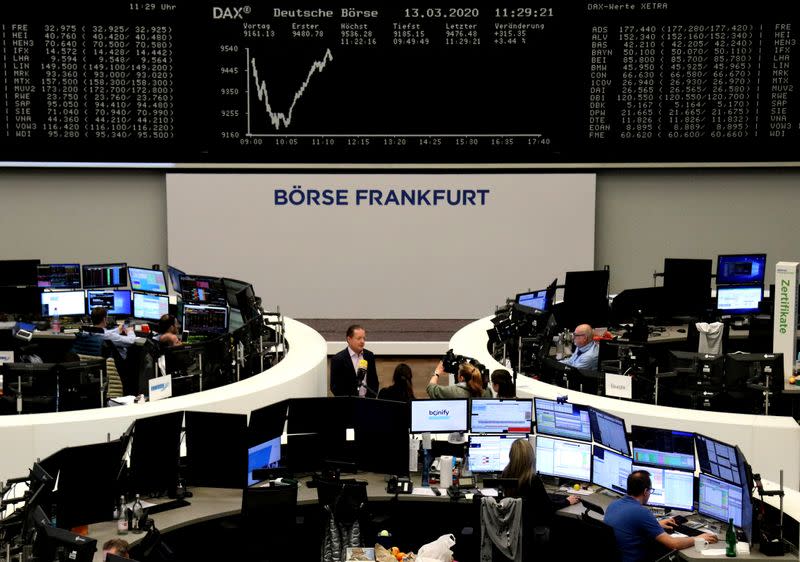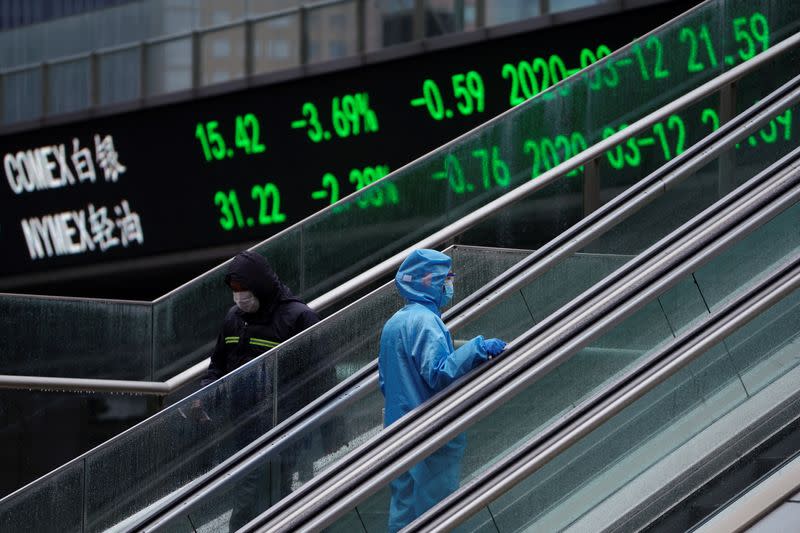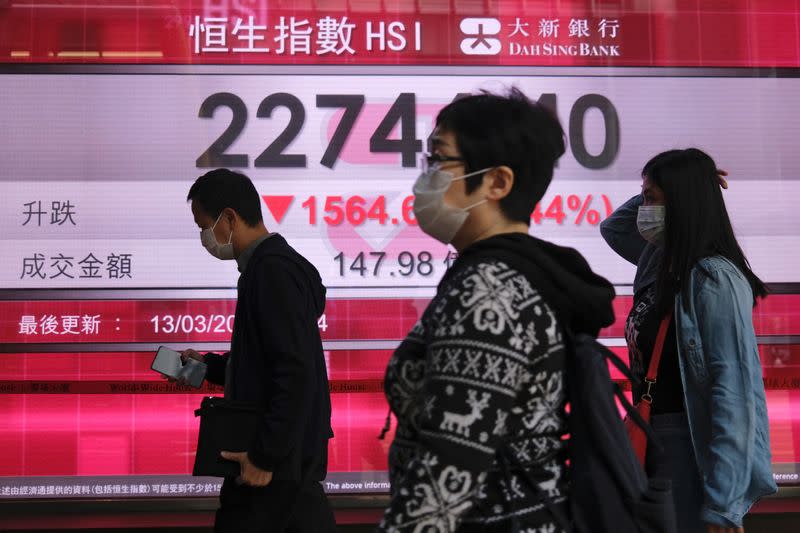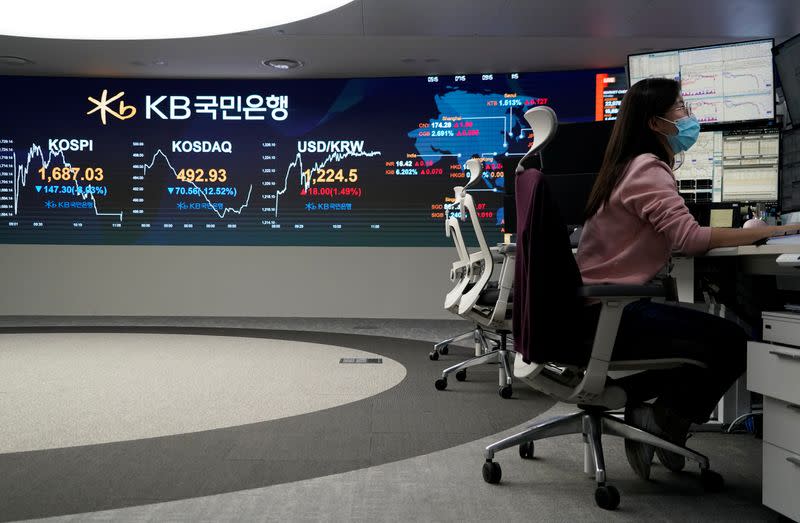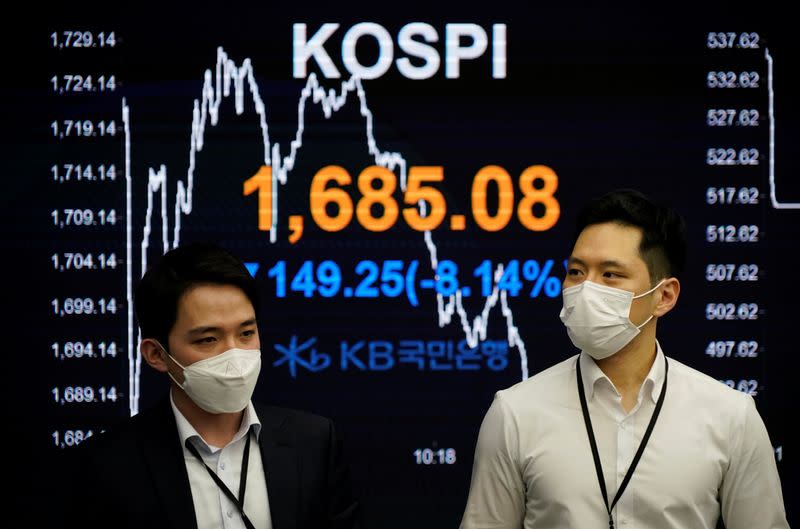World stocks rise on spending hopes, still set for worst week since 2008
By Abhinav Ramnarayan
LONDON (Reuters) - World stocks bounced off their lows on Friday on hopes of more central bank stimulus and government spending, but were still set for their worst week since the 2008 financial crisis, with coronavirus panic-selling hitting nearly every asset class.
European stock markets rose on hopes of a coordinated stimulus package from world governments after several sessions of sustained, heavy losses on expectations of a global recession that could be prolonged.
U.S. stock futures also pointed to a higher open, with Nasdaq futures up 5%.
Italy and Spain meanwhile imposed trading curbs, banning short-selling of dozens of stocks, to stem a market rout triggered by the coronavirus outbreak that saw European stock exchanges post their worst-ever losses on Thursday.
But the MSCI world equity index, which tracks shares in 49 countries, hit a three-year low in Asian hours and is down nearly 16% this week so far -- its worst run since October 2008 when Lehman Brothers' collapse triggered the global crisis.
"Markets are quite prepared for a period of falling output. The real fear is that you get second-round effects that result in a nastier, longer recession in the global economy," said Investec economist Philip Shaw.
"That is going to be very difficult to escape from given the monetary pedal is very close to the floor in many jurisdictions."
MSCI's main European index was up 6.5% by 1145 GMT, after having fallen more than 20% over the previous four sessions.
Earlier, Japan's Nikkei fell 10% before paring losses to close 6% lower. Australia's S&P/ASX200 had its wildest trading day on record, falling past 8% before surging in the last minutes of trade to settle 4.4% higher at the close.
MSCI's broadest index of Asia-Pacific shares outside Japan wobbled 0.1% higher by late afternoon after falling more than 5% in morning trade.
The recovery came as central banks from the United States to Australia pumped liquidity into their financial systems and as hopes grew that U.S. Democrats and Republicans could pass a stimulus package on Friday.
ITALIAN RECOVERY
Intervention from three of Europe's senior policymakers helped staunch the bleeding in Italian government bonds, which had seen the benchmark 10-year yield leap by 55 bps on Thursday -- its worst day since November 2011.
On Friday, the 10-year yield -- which moves inversely to price -- had risen another 20 basis points in early trade, but dropped back again after Italian central bank chief Ignazio Visco said the ECB can front-load bond purchases if needed.
The ECB unveiled fresh stimulus measures but kept interest rates steady on Thursday while its chief Christine Lagarde seemed to put the onus firmly on governments to tackle the coronavirus crisis, sending markets into a tailspin.
"Lagarde has no experience with markets and that became obvious yesterday," said Christoph Rieger, head of rates and credit research at Commerzbank.
Italy is one of the worst-hit countries in Europe from the spread of coronavirus, with the death toll shooting past 1,000 people and the government ordering blanket closures of restaurants, bars and almost all shops.
Oil steadied on Friday, after having dropped 7% on Thursday on U.S. President Donald Trump's surprise travel ban and on a flood of cheap supply coming into the market from Saudi Arabia and the United Arab Emirates.
Major currencies stabilised after furious dollar buying overnight, with the euro finding a footing around $1.1200 and the Aussie AUD=D3 recovering to $0.6300.
(Reporting by Abhinav Ramnarayan, Additional reporting by Tom Westbrook and Anshuman Daga in Singapore, Tommy Wilkes in London; Editing by Catherine Evans)

 Yahoo Finance
Yahoo Finance 